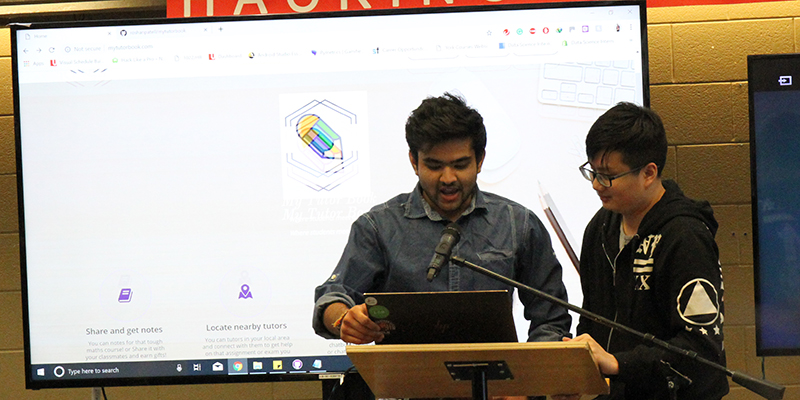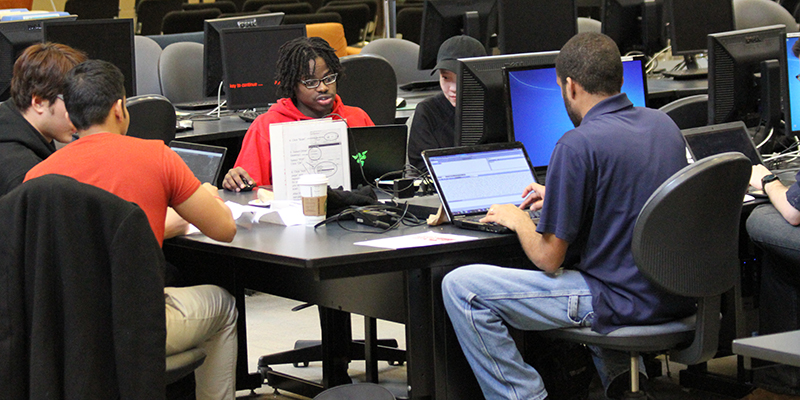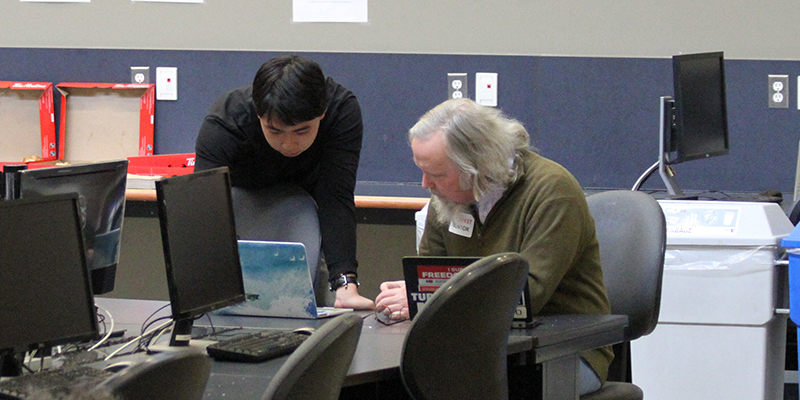How would you like a more intelligent weather app? What about an app that maps out your course load from semester one until graduation? Or a game that helps you become familiar with the York campus? Those were just a few of the things that students created at the seventh annual Steacie Library Hackfest that took place over reading week on February 20-21.
“Hackfest is all about giving students a chance to practice and give them a chance to explore,” said John Dupuis, Scholarly Publishing Librarian, and Engineering and Computer Science Liasion. “It’s essentially a chance to practice these real-life skills: coming up with ideas, formulating the ideas, pitching the ideas, and then working on realizing those ideas.
Fifty-five students from 11 different teams participated in this year’s event, with students coming from disciplines such as engineering, computer science, business, and environmental studies.
After checking in and finalizing their projects, teams were given a little under 16 hours spread over two days to use their hacking skills and come up with a working product that solves a real-world problem. Things wrap up with each group presenting their product to their peers, faculty, and guests from around campus. That last aspect is what makes Hackfest unique, as unlike other events every single group gets the chance to present their project and explain how they put it together.
“Our emphasis is on the students having a really meaningful learning experience. Our focus isn’t so much on competition, or being number one or being the best, it’s really about the students having a meaningful, engaging learning experience. That’s our goal.”
“I’m a first-year student here at York, and I didn’t know where I was within the coding community,” said Nileshana Abeysinghee from team SWA. “In high school I was able to handle coding pretty easily so I wanted to know how it is actually in the real world. My friend said: ‘there’s this hackathon, maybe you should join.’ By coming here I was able to learn where I am right now, what I need to improve on, and what is out there in the computer science world.”
Teams also had access to mentors made up of current and former York librarians, graduate students and staff to help refine their products over the course of the two-day event. The mentors provided guidance on a wide range of issues, handling everything from programming, product design, presentations, project management, and various types of data needs. A statistician was even on hand to help with statistical issues.
“I honestly thought our deal was really niche and kind of weird since it was a game, but they all had something to add and advice to give,” said Arjun Kaura from the team YorkU Sims who developed a game to help students become familiar with the York campus. “They helped a lot in trying to define what the game is supposed to do and how to refine our ideas about it.”
One of the mentors on hand this year was Sarah Shujah, a librarian with the University of Toronto Scarborough and the founder of the Steacie Hackfest. Shujah started the Hackfest seven years ago while serving as a librarian at York in an attempt to connect with the computer science and engineering community on campus.
“I was reading WIRED magazine and I found an article on the 24-hour hackathon – it’s a marathon of computer science solving problems. From that I thought ‘wouldn’t that be a great idea to do it in the library.’ A place where students are already working collaboratively and they can work together on solving problems in a space where they have access to research and people that can help them with that.
“What I see, which is great, is that they kept some of the main philosophies of the hackathon when I first started it. Making it non-competitive and really thinking about the collaborative aspect and the research side of things and connecting with experts in the field. I feel that the idea of a library ethos helps to embody that philosophy so I really love that the hackathon has kept that same philosophy.”
Although the event has maintained the principles it was founded with, Shujah is glad that the Hackfest has continued to evolve and is now bringing in a wider range of participants and mentors.
“In terms of how it has changed I see that it’s involving different experts and faculty members, not just the ones we’d typically engage within engineering and computer science, but connecting with entrepreneurs and people that help support startups on campus. So that [students] can take what they produce today and have access to resources to help make it happen if they want it to. I like that there’s that connection with Innovation York and Launch YU.”
A listing of each team and their project is below. Video of each team’s presentations will be uploaded soon.
Team Name: CYA Calendar
Project: A website that compares calendars between friends in real-time and helps organize times to get together
Team Name: SWA
Project: A smart weather app that not only tells you the forecast but also provides advice on how to go about your day
Team Name: Monte Carlo Royale
Project: An app that calculates the area of a shape via coordinates entered in by the user
Team Name: Degree Map
Project: Degree Map helps students optimize their course load from year one to graduation by mining data from the York academic calendar and presenting options for course selection
Team Name: Polar Reatment
Project: An educational tool that visually illustrates areas of water scarcity around the globe using the P5 library
Team Name: CoCook
Project: The CoCook app helps connect people around food from different areas of the globe by standardizing the input and sharing of recipes
Team Name: Insert Generic Name A
Project: A test-randomizer app that takes a bank of questions and generates a test of the specified link in a random order. The app also generates an answer key for that specifically generated test
Team Name: Insert Generic Name B
Project: A text-based chat website that randomly matches users and encourages meaningful discussions by limiting the ability to change chat partners
Team Name: MyTutorBook
Project: MyTutorBook.com helps connects students with tutors either in person or online, while also providing class-specific environments for students to interact with each other.
Team Name: YorkU Sims
Project: A 2D sprite-based game that uses the York campus as the game’s map in order to help new students become familiar with the campus’ layout.
Team Name: CHOOSR
Project: A social app that allows users to vote between two choices and presents a running total of all voters. Users can only see the results and comments after they’ve voted in order to decrease the risk of biasing a choice.
Team Name: EcoPlan
Project: An arcade game app designed to educate players on how to recycle properly in order to reduce waste and decrease the rate of contaminated recycling.



